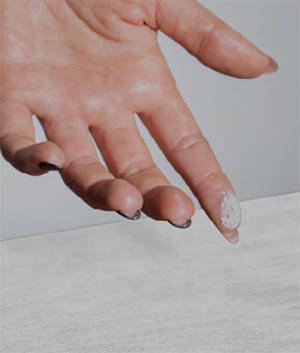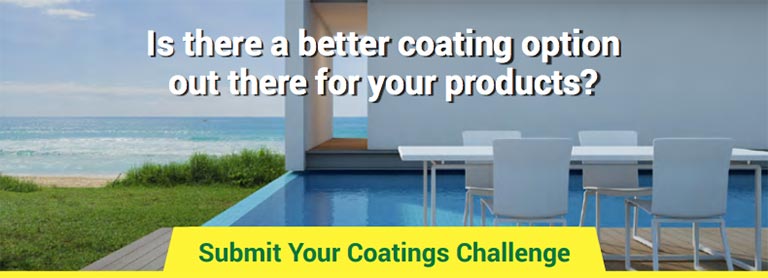When an organization with an operating production line reaches out to a custom coatings formulator, chances are their existing industrial coating is not a fit for their production and end-use requirements. The job of the chosen custom formulator is to quickly identify the cause of the problem, provide a recommendation, and formulate a coating that will fit seamlessly into the organization’s business.
The Problem: Chalking Epoxy Coating
An outdoor furniture manufacturer was receiving numerous customer complaints about its furniture’s white frames losing gloss and chalking off after a summer or two by the pool. The manufacturer used a white high-gloss epoxy coating on the furniture’s metal frames to provide a durable, aesthetic finish. Given epoxy’s reputation as a tough, versatile coating that can withstand the impacts of forklifts and vehicles while maintaining integrity in harsh chemical environments, the manufacturer assumed the coating would have no trouble in the furniture’s comparatively less harsh poolside environment. After their existing coatings supplier was unresponsive to repeated requests to troubleshoot the coating, merely stating that its coating met the specifications the furniture manufacturer provided, the manufacturer reached out to Aexcel, a custom coatings formulator.
Aexcel Begins an Expert Failure Analysis
Whenever an organization comes to a custom coatings formulator with failures in a product’s end-use environment, the coatings formulator must first develop a thorough understanding of the conditions the product is exposed to when it leaves the manufacturer. In the case of the outdoor furniture, a handful of the end-use conditions were addressed by the existing epoxy coating:
Durability: The coating needed to withstand rain, hail, wind, and other weather conditions. Furthermore, the manufacturer understood many customers were families, and wanted the furniture to stand up to whatever hazards children presented. Epoxies are known for their durability, so this concern was properly accounted for by the coating.
Chemical Resistance: The furniture needed to withstand exposure to chlorine and other chemicals used for treating pool water, as it would likely be located near a pool. Epoxies are used on everything from factory floors faced with intermittent chemical exposure to jet fuel tanks. The manufacturer’s choice of coating sufficiently addressed this concern as well.
Temperature Resistance: Although the manufacturer recommended customers bring the furniture indoors during the winter, the coating needed to endure all four seasons. Once again, the coating addressed this concern, as epoxies stand up to heat and cold better than most paints.
Failure Analysis Identifies Culprit: the Sun
While the epoxy coating accounted for many conditions, the existing coatings supplier failed to consider the furniture’s full story. Outdoor products are exposed to UV rays, which can wreak havoc on a coating. Epoxies are known to lose gloss and chalk off with UV exposure. Aexcel identified this as the source of the chalking that led to the customers’ complaints about the furniture.
With this in mind, Aexcel team members took their analysis a step further before providing a final recommendation. Some assumptions first needed to be evaluated, such as:
- The furniture will be outside for an extended period of time.
- The furniture will see large temperature swings and experience ponding water, freeze/thaw cycles, wind, rain, sleet, and snow.
- Specifications such as film thickness, abrasion resistance, mar resistance, corrosion resistance, types and duration of chemical and elemental exposures are appropriate for the environment.
As a custom coatings formulator with over 50 years worth of experience, Aexcel draws on this expertise when examining how environmental conditions will impact a product’s life.
Aexcel Delivers the Outdoor Furniture Manufacturer a Custom Solution
After an in-depth analysis, Aexcel ultimately instructed the furniture manufacturer to either:
- Convert to a two-component system, using an epoxy primer for durability, chemical, and temperature resistance, while adding a custom-formulated polyurethane topcoat. Polyurethanes do not react negatively to UV exposure, so the polyurethane topcoat would retain its gloss and not chalk off, leaving a trail of oxidized epoxy.
- Switch to a one-component polyurethane system. A custom formulator has the ability to create a polyurethane coating to accommodate the end-use conditions while fitting seamlessly onto an existing coating line. In addition to superior UV resistance, polyurethane coatings also offer:
- Excellent durability and abrasion resistance
- Superior chemical resistance
- Favorable flexibility
- Custom cure times
Had the outdoor furniture manufacturer not sought an alternative coating solution, customer complaints would have continued to pile up. The coating chemistry recommended to them by the existing coatings supplier was not well tailored to their product’s service, exposure, and end use. Fortunately, the manufacturer was able to switch seamlessly to Aexcel’s expertrecommended custom, one-component polyurethane system, which did not chalk in the summer sun.
Rely on Experience in Customization
With over 50 years in the custom coatings business, Aexcel specializes in prescribing custom coating formulations tailored to customers’ businesses. Aexcel has a rich history in polyurethane formulation, and has formulated and manufactured custom one-component and two-component polyurethane systems for many industries with varying performance, manufacturing, and VOC requirements, including:
- Architectural Products
- Warehousing
- Cylinders
- Agricultural Equipment
- Marine Engines
- Machinery
By custom formulating the coatings for your products, you can minimize failure analysis, improve efficiencies and processes, as well as fix a root cause from the get-go by starting with the perfect coating.


